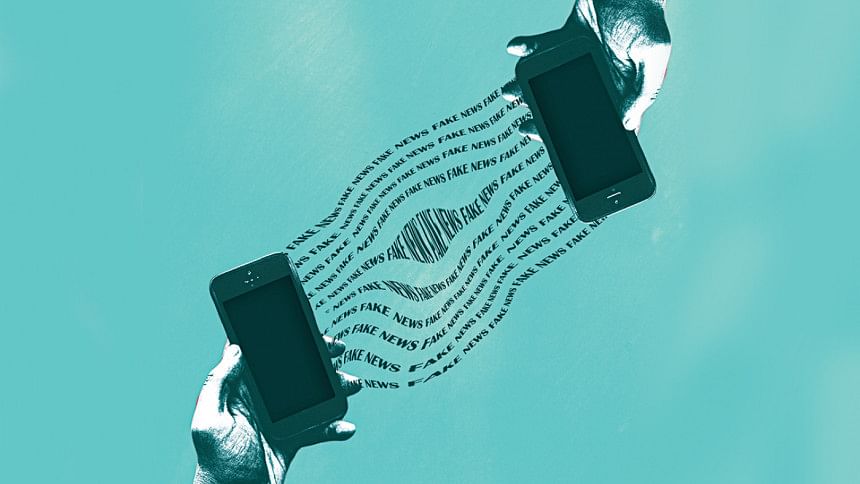The true story of fake news

This May, an online portal deliberately used a photo of Shrabonty Ananna—a model and social media influencer—in one of their reports with the title, "Illicit relationship with the uncle, girl arrested for killing her newborn". Since stories accusing women never fail to capture the imagination of the public, this report went viral on Facebook. In a few hours, around eight online portals had picked up the false report and re-shared it on Facebook. It was shared thousands of times with captions, including some urging her to commit suicide. An overwhelming number of people wrote scathing comments about the character of the 'media girl' (the implication being that a woman who works in the media simply cannot possess good moral character).
Some people even took pictures from her own Facebook account and created numerous fake accounts. A good number commented on her pictures and passed on rape threats for being a 'bad' and 'gone' girl. By this time, larger and more prominent (and thus, deemed more trustworthy) online portals had picked up the 'news', without verifying the facts. This only led more people to trust the story.
Shrabonty herself was unaware of anything until her friends called her one night and asked about her whereabouts. Reports now said she had been arrested by the police.
"I was dumbfounded. When I went online, I got hundreds of notifications and text messages from my friends, relatives, and acquaintances. I tried to contact the authorities of those portals, but I was unable to reach them as their contact information was not available on their websites," says Shrabonty. "Since it was around 11pm already, finding no other way, I posted a status saying that I am not the person who committed that crime."
"I even went live from my account but most of the people did not believe my words. Rather, many of them were commenting that 'a rumour can also have a grain of truth'," she adds.
The next day, Shrabonty went to the Khilkhet police station and filed a general diary. The police suggested that she contact the cybercrime unit and take their help. The cybercrime officials contacted the portals, who then deleted her photographs from their reports. The portal that first 'broke' the news went on to publish another report headlined, "False image ruins the life of a girl".
Additional deputy commissioner Md Nazmul Islam of the cybersecurity and crime department also posted a status on his personal Facebook account to discredit the rumour and describe how a promising model and social media influencer Shrabonty was made a scapegoat for such fake news.
But the damage had already been done.
Her credibility as a Facebook page promoter has taken a hit. Earlier, Shrabonty was earning Tk 2,000 for each hour of live chat on a Facebook page, with page owners hiring her to increase likes on their pages. With the money she helped support her family, as her husband is currently unemployed.
Since the false accusation, she has already been labelled a 'bitch' by thousands of Facebook users. Page owners are reluctant to hire her as people also post negative comments on her live videos on these pages. "That broke me psychologically. Even today, if I post a photo on my profile, people post dirty comments. Seeing these, my husband forbade me from making live videos as he couldn't take the negativity anymore," says Shrabonty.
Shrabonty's story accurately depicts how easy it is to spread false content on social media nowadays.
A major advantage of online portals is that these are able to attract a large audience online within moments—crucial in the age of information. But, by misusing that power, some fraud online portal owners, having no education or training in journalism, often disseminate fake news, mostly containing click-bait titles with sexual innuendos, personal attacks, celebrity gossip or even rumours in order to get cheap popularity.
This popularity helps these portals get some financial gains, as their number of readers and page views rise. In the rush to compete with others to publish the latest news, they do not verify facts and even deliberately publish fake news to attract readers—in the process, harming people's livelihoods and tarnishing the reputation of the innocent.

This directly goes against ethical journalism, or just journalism itself. The responsibility of a journalist is to investigate and verify facts and then present the truth to the public. Dr Md. Mofizur Rhaman, professor at the department of mass communication and journalism of the University of Dhaka stresses the negative impact of fake news and false accusations. "Fake news of the online portals is more dangerous than that of the mainstream media, which has a limited audience. But online portals, even with few resources, can reach a wider, global audience, in little to no time. As such, it's a lot more dangerous," says Dr Rhaman.
Furthermore, once a false report is published, it is difficult to stop the rumour mill. It is also difficult, if not impossible, to get in touch with these portals.
Currently, no online portal in Bangladesh is registered. Although in 2015, the Ministry of Information and Communication Technology announced that online portals need to be registered in order to prevent yellow journalism and ensure government benefits for the employees, the process of registration is yet to complete. According to the ministry, more than 8,000 portals have submitted applications for registration; in reality, however, the actual number of these portals is significantly higher.
In addition, since the draft National Online Mass Media Policy 2017 has not yet been approved by the cabinet, in absence of any guidelines, anyone can be an editor of a portal by spending around Tk 3,000 to create a website. Most of these portals are run by an editor alone. Many do not abide by even the most basic of journalistic ethics and do not bother to investigate or verify facts before posting a story. Rather, they practice 'copy-paste' journalism and increase the views of their websites by spreading rumours and false stories with the potential to go viral.
From such portals, we get false viral news such as 'cricketer Taskin beat up his wife', or 'actor ATM Shamsuzzaman is no more', or 'What did Porimoni do, watch the video to learn more'. Taskin and ATM Shamsuzzaman were forced to defend themselves in the mainstream media; however, a search on Google still shows those fake reports.
According to Monjurul Ahsan Bulbul, president of the Bangladesh Federal Union of Journalists (BFUJ), those practising yellow journalism online don't have any scruples about publishing such content. "Authorities responsible do not monitor such slandering and defamation by these portals. When they are questioned, they only declare the need for controlling the content on online news portals and social media."
This, however, leads down the dangerous path of censorship and constraints on freedom of expression. "We don't want that the online portals and social media be controlled as to what content they can publish; rather, we want to identify people who are misusing these technologies and are involved with yellow journalism," says Bulbul. It is a matter of journalism ethics, he emphasises.
Bulbul also notes that journalism and dissemination of information through social media is not the same thing. In mainstream media, a news report must go through several gatekeepers before being published, while online portals have no such gatekeepers. And this is why some such portals disclose the identity of rape victims, show pictures of dead bodies without giving warnings, give a step-by-step description of suicides, or fabricate negative stories, particularly on women
But how can we stop such practices? If we look at the laws related to media, the penal code of Bangladesh contains specific provisions (499, 500) for defamation by publishing any imputation by words or visual representation, and it is a punishable offence with two years' imprisonment or by fines (or both).
Additionally, the recently passed Digital Security Act 2018 gives maximum 14 years and minimum seven years of imprisonment and a fine of one crore taka for deliberately posting false, provocative, indecent or sensitive information on websites or any electronic platforms.
Purportedly, the act is to prevent the media indulging in yellow journalism. Many, however, are convinced this law is motivated less by the need to stop cyber crimes and more by the threat the government feel from the media and people's freedom of expression. According to mainstream media journalists, fraudulent portals continue to get away with slander while 'real' journalists are mostly targeted by this highly controversial law.
In such a dilemma, what recourse remains to stop such practices that endanger the lives and reputations of innocent people in the name of journalism? What policy changes can be undertaken without sacrificing freedom of expression?
Fahmidul Haq, associate professor of the department of mass communication and journalism at the University of Dhaka opines, "Every portal must have a registration with the government because they must be responsible for the content they publish. This registration must be free of cost. In 2012, when the initiative was taken to create a policy for online portals, it said that the registration required Tk 5,00,000 and it should be renewed annually. But this was criticised by small newspapers and online portal owners, as well as by us."
"Instead of annual renewals, registered portals can submit a report to the government once or twice a year about their activities," he adds.
On the other hand, the limited media literacy of people is another factor explaining why false accusations and fake news go viral. "People cannot differentiate between the mainstream media and fraud online portals and they think that Facebook live videos and television live broadcasts are similar and the dodgy online portals are equivalent to the online version of the mainstream media. If they could identify fake news reports and stop visiting such portals and taking such content for fact, that would be a great help for the victims," says Bulbul.
Fahmidul also stresses that the issue of media literacy and internet etiquette should be discussed more. "Since this is a matter of culture, it will take time for people to become media literate and such fake news will continue to flourish till then."

 For all latest news, follow The Daily Star's Google News channel.
For all latest news, follow The Daily Star's Google News channel. 



Comments